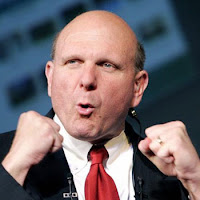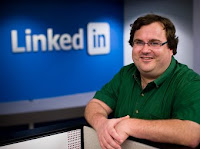
" This a fast life we are on a crash course
What you think I rap for, to push a fucking Rav 4?"
- Jay-Z
Hedge Fund manager and CEO of Greenlight Capital, David Einhorn can do it all. How do I know this? Because the first time I saw him he was bluffing people left and right and taking their money on the poker felt, just as he does during his day job. In the summer of 2006, Einhorn entered the World Series of Poker main event tournament held annually in Las Vegas and 8000 people later, he finished in 18th place, collecting a meager $660,000. He obviously didn't need the money, so it ended up going towards a couple charities, one of which is Michael J. Fox's.
Einhorn, who criticized Lehman Brothers a couple months before their epic collapse in 2008, has been making news again several times during the month of May, and for different reasons. During the first week of May, Einhorn disclosed a position his hedge fund was making on Yahoo! shares, pricing Yahoo! at $16.93. Remember those guys? Well they've been slowly falling by the waist-side for nearly a decade until finally some positive words were spoken by Einhorn. Why so bullish on Yahoo!? Because of its alleged 40% stake in Alibaba, the Ebay of China. Yahoo! shares surged 3% after this report got out. Einhorn mentioned how Yahoo's stake in Alibaba could be almost as large as Yahoo's whole market cap, which is currently sitting at $21 billion.
Two weeks later after Yahoo's SEC report came out, it turns out their stake in Alibaba isn't so lucrative after all, why? Yahoo said that Alibaba did some things behind the scenes without telling shareholders and board directors, and Alibaba said Yahoo! doesn't own 40% of them. Yahoo's stake in Alibaba was lucrative because of Alipay, a PayPal like system that apparently became a separate company from Alibaba sometime last year, without telling Yahoo! (or so says CEO Carol Bartz). For the past month, Yahoo! and Alibaba, under the leadership of English teacher turned millionaire CEO Jack Ma, have been taking jabs at one another going back and forth between who said what when. After this extremely unprofessional dispute brokeout, Yahoo's shares then tumbled 8% and shareholders and investors alike, were calling for Bartz's head.
"It's all about the he said she said bullshit," once sang Limp Bizkit lead singer Fred Durst. No one knows for certain yet who's telling the truth, but there's a lot of money in Chinese internet companies (Baidu and RenRen both went public this year) and that was the main reason Einhorn was so bullish on Yahoo's stock. On Wednesday, Einhorn made it clear at the Ira Sohn Conference (where people pay money for charity in exchange for expert opinion's on which stocks are hot, the current economy, etc.) that it's time for Microsoft CEO Steve Ballmer to step down. He related it to a moment when he was playing football with his friends (at Cornell) thirty some years ago and he knew he needed to step down from being quarterback and give someone else a shot.

Really? he's using that example in comparison to what the CEO of one of the greatest tech companies in history should do? As of March 31st, Einhorn has 1.39 million shares of Microsoft stock, equivalent to $230.2 million in cash. How seriously are we to take Einhorn's opinion here? Only a week after his alleged lobbying for Yahoo! stock, Yahoo stocks surged southward after the Alibaba dispute made headlines. I think Ballmer's $8.5 billion acquisition of Skype was a very important one and could propel Microsoft to the top of an untapped market, video calling. They can implement Skype into other products that are already doing well for them, namely Xbox Kinect. The Windows Phone, which came out two years too late, is lagging far behind Android, Apple, and even Blackberry. This may push them into the conversation with those competitors.
And today, Einhorn announced he's trying to close a deal with the New York Mets. Einhorn will own roughly 49% of the team and it'll cost him close to $200 million. Talk about making headlines. Microsoft shares actually rose 2.3% after Einhorn's words. Has his Yahoo! misstep made investors skeptical? I believe so. It's too early to be calling for Ballmer's head. This is the first legitimate acquisition they've made the past 2-3 years and the best thing the company's done since their 1.5% stake in Facebook. Most importantly, they kept Skype away from its competitor, Google. The next six months should tell a lot about how Microsoft plans to integrate Skype into their products and whether it'll be successful to the extent that the Windows Phone becomes a hot commodity rather than an outlier.
From short selling to being a short stack on the poker felt, David Einhorn has been around the block more than once and when it comes to taking large risks, he's as good as it gets. His constant charity donations makes you question the "greed is good" quote that Michael Douglass once engrained in our heads. But so far this month, with both Yahoo and Microsoft, Einhorn has made his opinions heard loud and clear. If Yahoo's stake in Alibaba somehow gets back up to that 30-40% level AND Skype turns out to be the biggest bust in M&A history, then maybe Einhorn will look as smart as he is. But for now, he has a better chance on the Mets making the World Series than either Ballmer getting ousted or Jack Ma settling the dispute with Carol Bartz.



